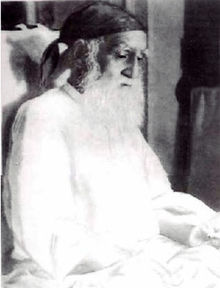Meher Ali Shah
Sufi scholar and a mystic Punjabi poet (1859–1937)
Meher Ali Shah (14 April 1859 – 11 May 1937) was a Sufi scholar from British India (present Day Pakistan) belonging to the Chishti order. He is known as a Hanafi scholar leading the anti-Ahmadiyya movement. He wrote several books, most notably Saif e Chishtiyai ("The Sword of the Chishti Order"), a polemical work criticizing the Ahmadiyya movement of Mirza Ghulam Ahmad.

~Meher Ali Shah

~Meher Ali Shah
Quotes
editThe Sayings and Teachings of the Great Mystics of Islam (2002)
edit(Muhammad Riaz Qadiri: The Sayings and Teachings of the Great Mystics of Islam, Gujranwala, Pakistan, 2004)
- Observance of the Holy Prophet's (Muhammad) Shariah and of his personal example (Sunnah) has precedence over everything else.
- p. 302
- There is no honor in doing things and performng rites and ceremonies (e.g., extravagance on occasions of marriage etc.) Which are not permitted by the Shariah.
- p. 302
- No one can become a true and accomplished Sufi without first gaining mastery of the Shariah sciences; indeed venturing on the Sufi path without Shariah knowledge involves many pitfalls.
- p. 302
- True faith can only be sustained through the love of Allah.
- p. 302
- The love of Allah and His Prophet (Muhammad) is infinitely superior to the love of mortal human beings and of other worldly things.
- p. 302
- Every breath of life is a priceless treasure; it should be devoted to the rememberance of the Lord.
- p. 302
- Single-minded rememberance of Allah is the supreme source of felicity and happiness.
- p. 302
- The Dervish should devote himself to the rememberane of Allah, rather than hanker after money or rather worldly gain.
- p. 302
- A Dervish is one who opposes whatever his baser self impels him to do.
- p. 302
- Being a Dervish is a state of mind, and does not necessarily depend on the type of dress that one wears. Dawood, Sulaiman and Yusuf were kings and apostles of God at the same time, while many eminent Sufis are known to have dressed richly and lived comfortably. Ideally, of course, it is preferable to follow the example of the Holy Prophet (Muhammad) who prided in simplicity and frugality.
- p. 302-303
External links
edit- Muhammad Riaz Qadiri: The Sayings and Teachings of the Great Mystics of Islam, Gujranwala, Pakistan, 2004